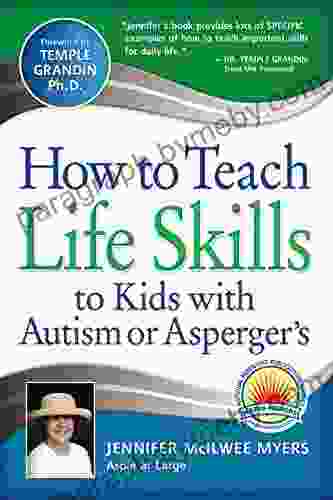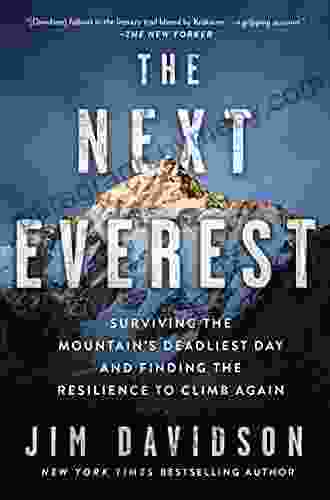How to Teach Life Skills to Kids with Autism or Asperger's: A Comprehensive Guide for Parents and Educators

Children with autism or Asperger's often face challenges in developing life skills that are essential for their independence and well-being. These skills include communication, social interaction, self-care, and problem-solving. While teaching life skills to children with autism or Asperger's can be a daunting task, it is essential to provide them with the support and guidance they need to succeed.
4.7 out of 5
| Language | : | English |
| File size | : | 5775 KB |
| Text-to-Speech | : | Enabled |
| Screen Reader | : | Supported |
| Enhanced typesetting | : | Enabled |
| Word Wise | : | Enabled |
| Print length | : | 346 pages |
This guide will provide parents and educators with practical strategies for teaching life skills to children with autism or Asperger's. We will cover essential areas such as:
- Communication
- Social skills
- Self-care
- Problem-solving
- Independence
Communication
Communication is a fundamental life skill for everyone, but it can be particularly challenging for children with autism or Asperger's. They may have difficulty understanding social cues, expressing themselves clearly, and engaging in conversations. To help children with autism or Asperger's develop their communication skills, parents and educators can use the following strategies:
- Use clear and concise language. Avoid using jargon or slang, and speak in a slow and deliberate manner.
- Be patient and understanding. It may take children with autism or Asperger's longer to process information and respond to questions.
- Use visual aids. Pictures, charts, and diagrams can help children with autism or Asperger's understand concepts more easily.
- Encourage social interaction. Give children with autism or Asperger's opportunities to practice their communication skills in social settings.
Social skills
Social skills are essential for building relationships and participating in society. Children with autism or Asperger's may have difficulty understanding social cues, interpreting facial expressions, and engaging in conversations. To help children with autism or Asperger's develop their social skills, parents and educators can use the following strategies:
- Teach children about social cues. Explain to children with autism or Asperger's what different social cues mean, such as eye contact, facial expressions, and body language.
- Practice social skills in role-playing exercises. This can help children with autism or Asperger's learn how to respond to different social situations.
- Encourage children to participate in social activities. This can help them practice their social skills in a real-world setting.
Self-care
Self-care skills are essential for independence and well-being. Children with autism or Asperger's may have difficulty with tasks such as dressing, bathing, and feeding themselves. To help children with autism or Asperger's develop their self-care skills, parents and educators can use the following strategies:
- Break down tasks into smaller steps. This can make tasks seem less daunting and easier to complete.
- Use visual aids. Pictures, charts, and diagrams can help children with autism or Asperger's understand how to complete tasks.
- Provide positive reinforcement. Praise children with autism or Asperger's for their efforts and progress.
Problem-solving
Problem-solving skills are essential for everyday life. Children with autism or Asperger's may have difficulty identifying problems, generating solutions, and evaluating the consequences of their actions. To help children with autism or Asperger's develop their problem-solving skills, parents and educators can use the following strategies:
- Teach children a problem-solving process. This process can include steps such as identifying the problem, generating solutions, and evaluating the consequences of each solution.
- Practice problem-solving skills in everyday situations. This can help children with autism or Asperger's learn how to apply their problem-solving skills to real-world situations.
Independence
Independence is a goal for many children with autism or Asperger's. To help children with autism or Asperger's become more independent, parents and educators can use the following strategies:
- Encourage children to make choices. This can help them develop their independence and decision-making skills.
- Give children opportunities to practice their skills. This can help them build confidence and become more independent.
- Be patient and supportive. It takes time for children with autism or Asperger's to develop their independence.
Teaching life skills to children with autism or Asperger's can be a challenging but rewarding task. By using the strategies outlined in this guide, parents and educators can help children with autism or Asperger's develop the skills they need to succeed in life.
If you are a parent or educator of a child with autism or Asperger's, I encourage you to learn more about the topic. There are many resources available to help you understand the challenges that children with autism or Asperger's face and how to best support them.
With patience, understanding, and support, children with autism or Asperger's can learn the life skills they need to live happy and fulfilling lives.
4.7 out of 5
| Language | : | English |
| File size | : | 5775 KB |
| Text-to-Speech | : | Enabled |
| Screen Reader | : | Supported |
| Enhanced typesetting | : | Enabled |
| Word Wise | : | Enabled |
| Print length | : | 346 pages |
Do you want to contribute by writing guest posts on this blog?
Please contact us and send us a resume of previous articles that you have written.
 Book
Book Novel
Novel Page
Page Chapter
Chapter Text
Text Story
Story Genre
Genre Reader
Reader Library
Library Paperback
Paperback E-book
E-book Magazine
Magazine Newspaper
Newspaper Paragraph
Paragraph Sentence
Sentence Bookmark
Bookmark Shelf
Shelf Glossary
Glossary Bibliography
Bibliography Foreword
Foreword Preface
Preface Synopsis
Synopsis Annotation
Annotation Footnote
Footnote Manuscript
Manuscript Scroll
Scroll Codex
Codex Tome
Tome Bestseller
Bestseller Classics
Classics Library card
Library card Narrative
Narrative Biography
Biography Autobiography
Autobiography Memoir
Memoir Reference
Reference Encyclopedia
Encyclopedia Renae Rae
Renae Rae Leigh Wilson
Leigh Wilson Jenny Chandler
Jenny Chandler Jessie Cal
Jessie Cal Jennifer Perkins
Jennifer Perkins Jeffrey Burton
Jeffrey Burton Jenny Doan
Jenny Doan Jeffrey M Stonecash
Jeffrey M Stonecash Nuala O Faolain
Nuala O Faolain Jermaine Harris
Jermaine Harris Jez Stewart
Jez Stewart Troy Andrews
Troy Andrews Melanie Scott
Melanie Scott Jerry L Ross
Jerry L Ross Michael Witwer
Michael Witwer Peter Stark
Peter Stark Marsha Wenig
Marsha Wenig Jen Green
Jen Green Jill Carlyle
Jill Carlyle Patricia Spyer
Patricia Spyer
Light bulbAdvertise smarter! Our strategic ad space ensures maximum exposure. Reserve your spot today!

 Herman MitchellUnveiling the Lost Saga: Discover the Viking Who Sailed to America and the...
Herman MitchellUnveiling the Lost Saga: Discover the Viking Who Sailed to America and the... Josh CarterFollow ·3.4k
Josh CarterFollow ·3.4k Henry Wadsworth LongfellowFollow ·7.7k
Henry Wadsworth LongfellowFollow ·7.7k Ivan TurgenevFollow ·8.1k
Ivan TurgenevFollow ·8.1k George BellFollow ·5.8k
George BellFollow ·5.8k Anton ChekhovFollow ·15k
Anton ChekhovFollow ·15k Shane BlairFollow ·17.2k
Shane BlairFollow ·17.2k Darrell PowellFollow ·17k
Darrell PowellFollow ·17k Douglas PowellFollow ·9.5k
Douglas PowellFollow ·9.5k

 Jeremy Mitchell
Jeremy MitchellUnveiling the Truth: The Captivating Saga of The Elephant...
Embark on a poignant journey through the...

 Marvin Hayes
Marvin HayesThe Day The World Came To Town: A Heartwarming Tale of a...
In the quaint...

 Hugh Bell
Hugh BellExplore the Avian Treasures of Wisconsin: A Review of...
Unveiling the Secrets of...
4.7 out of 5
| Language | : | English |
| File size | : | 5775 KB |
| Text-to-Speech | : | Enabled |
| Screen Reader | : | Supported |
| Enhanced typesetting | : | Enabled |
| Word Wise | : | Enabled |
| Print length | : | 346 pages |
















